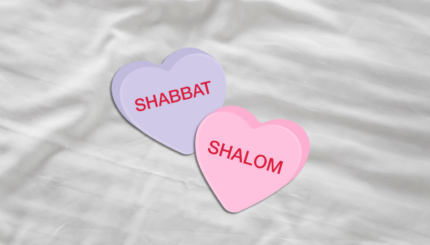Jews read sections of the Torah each week, and these sections, known as parshiyot, inspire endless examination year after year. Each week we will bring you regular essays examining these portions from a queer perspective, drawn from the book Torah Queeries: Weekly Commentaries on the Hebrew Bible and the Torah Queeries online collection. This week, Alex Carter sees the beauty of the delicate ecosystem of the Biblical wilderness – and in the unique queer culture we’re in danger of losing.
This week’s parsha, B’midbar, begins, as many parshiyot begin, with the words, “G-d spoke to Moses…” But this week, it specifies that G-d spoke to Moses “in the wilderness of Sinai…” It continues with a census of the men of military age, and with a description of how the tribes were to be arranged in the camp and for marching through the wilderness. Each tribe was placed in relation to the Mishkan, the Tabernacle, which was at the center of the community at all times.
But I want to focus on the very first line – “G-d spoke to Moses in the wilderness of Sinai….”
In everyday speech, we almost never hear the word “wilderness” without it being accompanied by some variant of “lost in…” or “coming in from…” We normally think of it as a desolate place of isolation and loss.
But the Torah narrative gives us a different perspective. The children of Israel were in a wilderness, yes. But it was not a desert. It was not a place of desolation. There was vegetation, shade, and even water, to sustain the people during their travels.
G-d brought the children into the wilderness in order to create a people – unlike their neighbors, unlike any other community that had been seen to that point in human history. G-d spoke to Moses in the wilderness – at the burning bush in the book of Exodus, and throughout the remainder of the Torah.
So we see that wilderness can be a creative, expressive space, where the noise and confusion of “civilization” fades. G-d created a whole people in the wilderness; we, fashioned in the Divine image, can use the wilderness of social exile to think our own thoughts, honor our unique perspectives, and develop our own forms of expression, of worship, of living.
I celebrate the social and legal progress our queer community has made. We deserve to be recognized as equal and valuable members of the human family and the body politic.
But I worry that perhaps the lure of progress – of more acceptance into straight “civilization” – will lull us into assimilation and complacency. And we’ll forget the benefits of being in the wilderness. We are a people unlike our neighbors, unlike any other community that has been seen to this point in human history
Yet the queer community is in danger from the very legal and social progress we may celebrate. I worry that queer culture is yet another unique, delicate ecosystem in danger of destruction by appropriation or assimilation. In Washington, DC, the annual Halloween high-heel “drag” race is covered by local television stations. Formerly queer (read: affordable) neighborhoods are being co-oped and co-opted – bland yuppies with strollers are displacing the rainbow of queer expression. I’m not sure if this is good.
We are far too fabulous to want to be just like everyone else. Just as every tribe was arranged to have a different view of the Mishkan, with each person having a different view of the holy place, so we too should value and explore our community’s unique perspective on the divine, and on human relations.
Let us not forget to honor that creative wild space, and keep creating a unique and vibrant community. Let us keep creating rituals, ways of living, ways of loving. Let us not just rush into to the relative safety – the leeks and onions, if you will – of heteronormative civilization.
Let us not squander the gift of the wilderness. Let us not allow the pull of straight civilization to unravel the fabric of our community. For those of us who may yearn for, and attain, the trappings of middle-class respectability – let us honor and care for those who can never pass, or who don’t want to assimilate. The Jewish community has anguished over the assimilation issue for over a century, and still struggles with it. Let us lead the way here.
The world needs us to remember, honor, and preserve our wilderness. There may be times when we may need to go back there, for a little while, to regroup, to remember our uniqueness, to refresh ourselves at Miriam’s well. And then return to civilization and continue to fight, in our integrity, for our rightful place in creation, in a way that honors our uniqueness even as it affirms our commonality with all humankind.
As I write this, lyrics from the 1960s Zombies hit are running through my head: “Wild thing, you make my heart sing…”
Let us stay in touch with our “wild thing” souls. Let our hearts sing our unique song.
Torah
Pronunced: TORE-uh, Origin: Hebrew, the Five Books of Moses.


